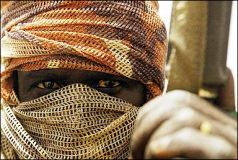INTERVIEW-Darfur rebel group suspends talks with govt
By Opheera McDoom
JABEL MOUN, Sudan, Feb 8 (Reuters) – A breakaway Darfur rebel group has suspended negotiations with the Sudanese government after Arab militias attacked villages in its areas, the leaders of the movement said.
 The group, the National Movement for Reform and Development, (NMRD), split from the two main Darfur rebel movements last year but signed separate ceasefire agreements and humanitarian and security protocols with Khartoum on Dec. 17. The two sides were supposed to meet on Jan. 17 to discuss implementing those deals.
The group, the National Movement for Reform and Development, (NMRD), split from the two main Darfur rebel movements last year but signed separate ceasefire agreements and humanitarian and security protocols with Khartoum on Dec. 17. The two sides were supposed to meet on Jan. 17 to discuss implementing those deals.
“We never went and now we are suspending negotiations,” said political secretary Khalil Abdallah.
“If we do not get an answer for all these accidents we will not go.” He was referring to two Arab militia attacks on Dec. 21 in the area near Jabel Moun in West Darfur state.
“Still now we respect what we signed but we don’t want to continue if we never get any commitment from the Sudanese government,” he added.
He said the government had armed, supported and worked with the Arab militias, known locally as Janjaweed, and still maintained full control over them.
The Janjaweed stand accused of a campaign of looting, burning, killing and rape in Darfur. The government denies any links to them, saying they are bandits.
It has committed to disarm the Janjaweed in several agreements with rebels and the United Nations.
But Abdallah and NMRD military commander, Gibril Abdel Karim Bari, said they would not respect any deal the two main rebel groups agree with the government in talks to resolve the conflict in the Nigerian capital Abuja.
“We say clearly we don’t accept anything from Abuja,” Abdallah said. “We only accept something that we signed by our hand, by ourselves with negotiations with the government.”
CHADIAN CONNECTION
Colonel Bari received his rank while serving in the Chadian army in the coup that put President Idriss Deby in power. He and Abdallah are both from the Zaghawa tribe, which spans the border between Sudan and Chad.
The NMRD has most of their positions along this border and a few Chadian soldiers have fought with them. But it denies formal support from the Chadian government, which is mediating its talks with the government.
Tens of thousands have died in Darfur since the two main rebel groups took up arms in early 2003 accusing Khartoum of neglect. More than 1.8 million people have fled their homes and hundreds of mostly non-Arab villages have been destroyed.
Bari said his split from the rebel group the Justice and Equality Movement (JEM) in April last year left the political leadership outside the country, headed by Khalil Ibrahim, with little more than 50 loyal soldiers on the ground.
But it had added to its ranks since then.
“The political leaders like Dr. Khalil – they have information, communications but no power on the ground,” said Bari, who is in his mid thirties.
Most of the NMRD wore yellow or green scarves wrapped loosely around their hair and faces. Many wore uniforms and all carried new or well-maintained Kalashnikovs.
Bari said they cooperated closely with the other main rebel group, the Sudan Liberation Army (SLA).
He said JEM military commanders, then headed by Bari, believed that Ibrahim and other political leaders were not concerned with Darfur’s problems of neglect and marginalisation, but more with taking power in Khartoum with Islamist Hassan al-Turabi’s opposition party.
“He wanted party power in Khartoum. He did not care about Darfur, so we decided to split from them,” Bari said, sitting under a tree in a camp in the middle of red sandy mountains.
They made their move after Turabi’s party was accused of attempting a coup in the capital last March.
